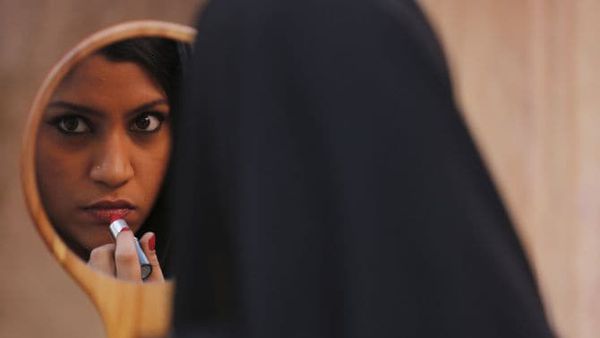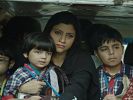Eye For Film >> Movies >> Lipstick Under My Burkha (2016) Film Review
Lipstick Under My Burkha
Reviewed by: Jennie Kermode

In a world where hardcore porn is increasingly accepted as a normal part of life, romance novels occupy a strange space. Their milder, more emotional expressions of sexuality, whilst not inherently any less realistic, are frequently ridiculed. They are held up as examples of bad literature, though few people would think of judging porn films by the same metric as Bergman or Kurosawa. Perhaps people simply find it strange that anyone would resort to them when there's stronger stuff available, like adults drinking shandy at a booze-up. But not everybody can access the strong stuff. Sometimes people take what they can get.
For women in Bhopal, erotic outlets can be hard to find. Usha (Ratna Pathak) is a 55-year-old auntie, relied on by her family for all sorts of things but allowed very little space of her own. When she gets hold of a paperback novel called Lipstick Dreams, she begins to discover a part of herself that she's been suppressing all her life. The discovery coincides with the appearance of a muscular young lifeguard at the local pool, and when he offers to teach her to swim, pulling away her towel and putting his hands on her shoulders, she's quickly out of her depth.

Usha's story is one of four loosely interconnected tales in this film, all of which explore the contrasts between the romantic ideas in the book, the rigid expectations of traditional society and the realities of human experience. Shirin (Konkona Sen Sharma) is married but her husband is away a lot and when he comes home he shows little interest in her. She's training for a job in sales, but doesn't know if he will permit her to take it. As it emerges that he has secrets of his own, their relationship deteriorates rapidly, and the power structure underlying what had seemed like a happy relationship is laid bare.
Rehana (Plabita Borthakur) is hoping to avoid taking the traditional route of going straight from her parental home into an arranged marriage by going to college. A sweet, shy girl who generally goes around in a burkha, she steals some lipstick from the local mall, and this small act of daring leads her to explore the sensual world of singing, dancing, drinking and flirting (still very guardedly) with boys. She also discovers campus feminism, but is she really strong enough to live up to her bold talk, and how will the other girls at her college react to her new persona?
Leela (Aahana Kumra) at first seems very different from the others. She's actively sexual and fierce about getting what she wants, a young Hindu woman with an impending arranged wedding who is planning to elope with her Muslim lover. To Western eyes, she seems a much more modern, liberated individual, but with this comes a new set of problems - Leela may be different but the society she lives in isn't, and even in contexts where she might expect support she gradually discovers that others won't give her the respect she has for herself.
Like other recent feminist films emerging from India, Lipstick Under My Burkha tends to polarise gender in a way that goes beyond mere observation. Every male character is aggressive or controlling on some level, though some still manage to elicit sympathy. The eventual gathering of the women in one place suggests a growing sense of themselves as members of an oppressed group, and though there isn't the sense of fight that Western viewers might hope for, the simple solidarity they display - combined with a willingness to acknowledge that they are sexual beings - suggests a step forward. Its a small act of rebellion just as the romance novel is a small expression of sexuality, but it's no less important for that. Meanwhile the social focus on reproduction, the use of rape as a means of control and the notion that a happily married woman should never want to leave the house remind us that the ownership of sexuality is intrinsic to a much larger set of issues.
Cutting between the four stories, director Alankrita Shrivastava is effective in capturing the hectic character of a community where homes are packed close together and everybody is constantly watching what the neighbours are doing. A scene in which Usha challenges local officials implies that there is no trustworthy authority the women can turn to. Shrivastava balances the stories well and the skilled ensemble cast means that things always remain interesting, with no one story stealing attention from the others. The result is an energetic, passionate film which, though it might sometimes benefit from a bit more subtlety, makes its points well.
Reviewed on: 15 Feb 2017














